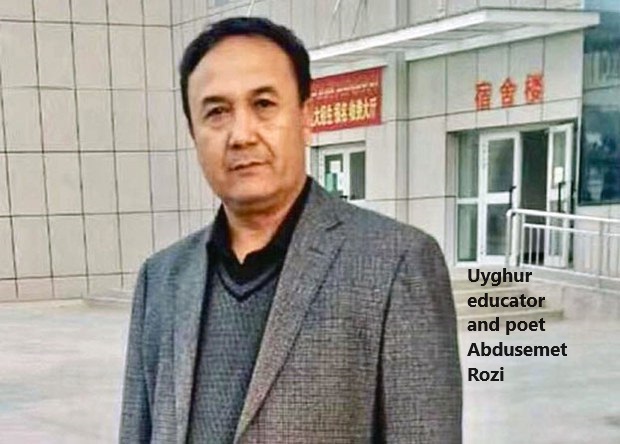Uyghur poet Rozi confirmed dead in Xinjiang Jail

The body of a Uyghur educator, researcher and poet who died in prison in Xinjiang in late August was taken by authorities directly to a cemetery for burial instead of first being returned to his family, a police officer and researcher who has compiled a list of arrested Uyghurs said.
Abdusemet Rozi, 57, hailed from Suntagh village in Atush, also called Artux, capital of the Kizilsu Kyrgyz Autonomous Prefecture in Xinjiang. He was jailed for a second time in 2022, is said to have fallen ill while in prison, and died on Aug. 31, according to the sources, although it is unknown why he was imprisoned or to which ailment he succumbed.
The authorities who took his body to a cemetery summoned seven or eight members of Rozi’s family to the Suntagh village party committee and informed them of his death, a village police officer told Radio Free Asia. Also in attendance were the local Chinese Communist Party secretary, village head, officials from the Public Security Bureau, and state security personnel.
The police officer, who did not provide information about the reason for Rozi’s arrest and sentencing, said authorities asked his relatives if they had any complaints about the man’s death — an apparent intimidation tactic so that Rozi’s family would not raise questions about his cause of death or the possibility of torture.
The police officer said Rozi served his more recent sentence at Ulughchat Prison in Atush and died at the prison hospital at the end of August.
“I was there when Abdusemet Rozi’s body was transferred from the prison,” the police officer said.
At the time, authorities told Rozi’s family that he died of an illness and had not been tortured.
“They told them about his health problems and that after a check-up, he had a heart problem,” he said. “He was taken to the hospital in the morning because he wasn’t feeling well. The hospital treatment didn’t work, and he passed away.”
Authorities told Rozi’s family that if they had any doubts or complaints, an autopsy would be done; but if not, they would only be shown his face, to which they agreed, said the police officer.
An intellectual
But Abduweli Ayup founder of Norway-based Uyghur Hjelp, or Uyghuryar, which maintains a database of Uyghurs detained in Xinjiang, said Rozi became ill in jail and died because of physical and mental torture.
Rozi was one of the top Uyghur researchers whose name appeared on a list of arrested Uyghur intellectuals compiled by Ayup.
From 2005 to 2010, Rozi researched and wrote a book titled Izchilar, or The Followers, about students of the famous Uyghur educator Memtili Tewpiq, he said.
“Abdusemet Rozi is one of the intellectuals from Atush who had strong organizational skills,” Ayup said. “He gave speeches on new textbook reform to the teachers.”
In 2019, authorities sentenced Rozi to 20 years in prison, released him in 2021 for health reasons, and rearrested him in September 2022, Ayup said. He remained in prison until his death, he said.
The reason for Rozi’s first arrest is unknown, though it occurred at a time when authorities in Xinjiang were conducting mass arrests of Uyghurs, including educators and intellectuals, and detaining them in “re-education” camps or prisons.
Authorities may have arrested Rozi because of his research topics and social activities, Ayup said, citing the scholar’s article on teaching in the Uyghur language, which he presented at an educational conference.
Rozi graduated from Kashgar Pedagogical Institute in 1987 and started working as a teacher at Atush 4th Middle School.
In 1998, he became a researcher and teacher at the Kizilsu branch of Xinjiang Television and Radio University, where he worked until his first arrest in 2017, Ayup said.
Rozi entered the literary arena in Xinjiang with a poem he published in a Kizilsu newspaper during his college days before he began teaching and working as a researcher, he said.
“He was doing research on teacher and student relations, as well as on the future and the current situation of radio and television education,” Ayup said.
— RFA report, Nov 21, 2023
https://www.rfa.org/english/news/uyghur/imprisoned-poet-11212023140614.html
-
Book Shelf
-
 Book Review
DESTINY OF A DYSFUNCTIONAL NUCLEAR STATE
Book Review
DESTINY OF A DYSFUNCTIONAL NUCLEAR STATE
- Book ReviewChina FO Presser Where is the fountainhead of jihad?
- Book ReviewNews Pak Syndrome bedevils Indo-Bangla ties
- Book Review Understanding Vedic Equality….: Book Review
- Book Review Buddhism Made Easy: Book Review
- Book ReviewNews Elegant Summary Of Krishnamurti’s teachings
- Book Review Review: Perspectives: The Timeless Way of Wisdom
- Book ReviewNews Rituals too a world of Rhythm
- Book Review Marx After Marxism
- Book Review John Updike’s Terrorist – a review
-
-
Recent Top Post
-
 CommentariesTop Story
Palestinians at the cross- roads
CommentariesTop Story
Palestinians at the cross- roads
-
 Commentaries
While Modi professes concern for the jobless, “his government’s budget escalates class war”
Commentaries
While Modi professes concern for the jobless, “his government’s budget escalates class war”
-
 CommentariesNews
Politics of Mayhem: Narrative Slipping from Modi ….?
CommentariesNews
Politics of Mayhem: Narrative Slipping from Modi ….?
-
 Commentaries
Impasse over BRI Projects in Nepal
Commentaries
Impasse over BRI Projects in Nepal
-
 CommentariesNews
Yet another Musical Chairs in Kathmandu
CommentariesNews
Yet another Musical Chairs in Kathmandu
-
 CommentariesTop Story
Spurt in Anti-India Activities in Canada
CommentariesTop Story
Spurt in Anti-India Activities in Canada
-
 NewsTop Story
Nepal: Political Stability Under Threat Again
NewsTop Story
Nepal: Political Stability Under Threat Again
-
 NewsTop Story
Accountability Tryst With 2024 Ballot….
NewsTop Story
Accountability Tryst With 2024 Ballot….
-
 NewsTop Story
What Would “Total Victory” Mean in Gaza?
NewsTop Story
What Would “Total Victory” Mean in Gaza?
-
 CommentariesTop Story
The Occupation of Territory in War
CommentariesTop Story
The Occupation of Territory in War
-
AdSense code



















